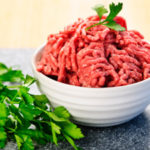Red Meat Risks

The more red meat in your diet, the greater your risk of dying from cancer, heart disease, stroke, diabetes, kidney disease, chronic liver disease and infections. Researchers at the National Cancer Institute reached this conclusion after following 536,969 people ages 50 to 71 in six states for 16 years. At the outset, all the participants reported on their consumption of processed and unprocessed meat (including beef, lamb and pork) as well as poultry and fish. The researchers noted that the strongest links between health and a diet reported to be high in red meat were death due to chronic liver disease, diabetes, respiratory diseases and kidney disease. They also made the point that the iron in red meat (heme iron) as well as the nitrates and nitrites found in processed meats increased the risks seen. However, the study had good news for people who eat more white meat from chicken and fish than red meat. Even without replacing all red meat in their diets, the data showed that participants who ate the most white meat had a 25 percent lower risk of dying over the course of the study compared to those who ate the least white meat.
My take? I don’t eat red meat (or chicken) myself, although I do eat fish. I don’t believe anyone needs to eat red meat to be healthy, and this study adds to accumulating evidence that a diet high in red meat can be very unhealthy. We can get the protein and essential fatty acids we require from other food sources, such as wild-caught, cold-water fish; free-range, omega-3 rich eggs; and non-animal sources such as tofu, beans and nuts.
Source:
Arash Etemadi et al, “Mortality from different causes associated with meat, heme iron, nitrates, and nitrites in the NIH-AARP Diet and Health Study: population based cohort study.” BMJ, May 9, 2017, doi: doi.org/10.1136bmj.j1957
Also in this week’s bulletin:
If you are tired of too many prescriptions – and have had enough of taking medications for ailments that may not require them – then my new book may be for you: Mind Over Meds looks at the problem of overmedication, the science that shows drugs aren’t always the best option, as well as helpful, reliable integrative medicine approaches.










